Watermelon (Citrullus lanatus) is a scrambling and trailing vine in the flowering plant family Cucurbitaceae. Watermelon is grown in tropical and subtropical areas worldwide for its large edible fruit, also known as a watermelon, which is a special kind of berry with a hard rind and no internal division, botanically called a pepo. The sweet, juicy flesh is usually deep red to pink, with many black seeds, although seedless varieties have been cultivated. The fruit can be eaten raw or pickled and the rind is edible after cooking.
In 2016, global production of watermelons was 117 million tonnes, with China alone accounting for 68% of the total. Secondary producers with more than 1% of world production included Turkey, Iran, Brazil, Uzbekistan, Algeria, the United States, Russia, Egypt, Mexico, and Kazakhstan.
Watermelons are a sweet, popular fruit of summer, usually consumed fresh in slices, diced in mixed fruit salads, or as juice. Watermelon juice can be blended with other fruit juices or made into wine. The seeds have a nutty flavor and can be dried and roasted, or ground into flour. Watermelon rinds may be eaten, but most people avoid eating them due to their unappealing flavor. They are used for making pickles, sometimes eaten as a vegetable, stir-fried or stewed.
Watermelon fruit is 91% water, contains 6% sugars, and is low in fat. In a 100 gram serving, watermelon fruit supplies 30 calories and low amounts of essential nutrients. Only vitamin C is present in appreciable content at 10% of the Daily Value. Watermelon pulp contains carotenoids, including lycopene. The amino acid citrulline is produced in watermelon rind (all values are approximates and must be used for informational purposes only. Real world values may differ).
Each packet contains:
- F-1 Hybrid Watermelon – Super King – Non-GMO fruit seeds.
- Weight: 50 gram.
